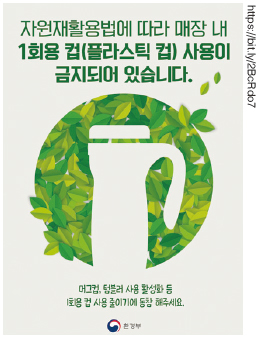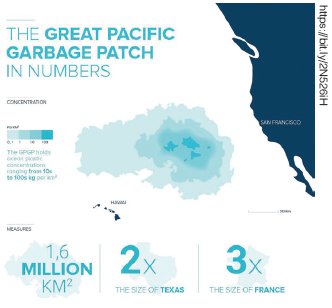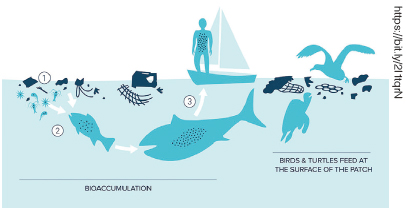Nowadays, you might have seen posters banning the use of plastic cups in cafes or stores. In other words, you must use a mug to drink in the store. If you use a plastic cup without keeping this, the store could be fined up to 2 million KRW. However, many people still do not know this and drink coffee in plastic cups in the cafe. In addition to this regulation, plastic reduction policies are being implemented. Why are people trying to reduce the use of plastic this way?

The background to this story occurred this April. Recycling collection and screening companies refused to collect vinyl and plastic waste, causing a so-called “waste chaos.” The controversy started when China stopped importing solid waste such as waste plastic, undifferentiated wastepaper, and waste metal, citing environmental protection and health care. As the export route of China was blocked, prices of waste vinyl and waste plastic plunged, and recycling companies, whose profits deteriorated, refused to collect the waste. Later, the chaos ended as companies picked up the waste again but the source of the problem has still not been resolved.
What is plastic? Plastic comes from the Greek word plastikos, which means “suitable for molding.” It means that this material is good to use by molding it into convenient forms for human use. As plastics are easy to use, we can easily find them around us. Starting with the plastic cups in the cafe, hangers at home, laptops, subway handles, and even signboards are covered in plastic. Thus, we cannot live without plastic. However, the use of plastics has to be reduced. They have the advantage of being easy and cheap to produce but they threaten the Earth by causing waste problems and pollution. In particular, these plastic harm the marine ecosystem.

Once, a picture of a turtle with a straw in its nose was published. This photo was shocking and popular on the Internet. Also, there was a picture of a dead Albatross with plastic in its stomach. These animals cannot distinguish between food and plastic in the ocean so they eat these things and die. You might have heard about the Pacific Garbage Island. This area is an example of the plastic problem. The island is huge; more than 15 times the size of South Korea and is called the Great Pacific Garbage Patch (GPGP). The island was discovered in the summer of 1997, when a man named Charles Moore was on a yacht race from Los Angeles to Hawaii. GPGP is comprised of 90 percent of non-decaying vinyl and plastic, collected by winds and circular currents. There is about 80,000 tons of large and small trash in GPGP, but the biggest problem among them is micro-plastic.
Plastic, which is unlikely to decompose, also begins to break down after hundreds of years. Worn by ocean currents and sunlight, they become very tiny particles. Such broken plastic, less than 5 millimeters in size, is called micro-plastic. These plastics are not only produced by the decomposition of large plastics, but are also found in toothpaste, cleaning agents, and scrubs. Micro-plastics are so small that they are not filtered by sewage treatment facilities, and they enter oceans and rivers.
Aquatic organisms eat these micro-plastics that flow into the ocean, and the marine ecosystem becomes damaged. The number of marine species that eat micro-plastics continues to rise. Plastic-eating fish are easily eaten by enemies because of their slower movement. When a creature eats these plastics, they can accumulate inside it and a creature higher up the food chain will eat the creature again. Then, micro-plastics climb up the food chain and climb on the human table. This means that small pieces of plastic are eaten by us. Some 70 percent of the anchovies caught in Japan were found to have micro-plastics inside them. Also, there was a case of micro-plastics found in sun-dried salt in Korea. The thrown-out plastics have become a “boomerang” and are returning. There are no safety or environmental standards yet about how dangerous they are to humans. Therefore, it is important to prevent in advance because we do not know how harmful it is to the human body.

For these reasons, we have to reduce the use of plastics. Then how can we reduce this? Just changing some minor habits can reduce the amount of plastic we use.
First, use a tumbler. You can keep your beverage warm or cool by using a tumbler, and some cafes offer discounts when you take yours. Actually, after starting the plastic cups regulation, the use of the tumblers is increasing.
Second, reduce the use of plastic straws. Straws are the most commonly used disposable product, so Starbucks is currently using paper straws to reduce plastic. Try not to use a plastic straw consciously even when you drink at a convenience store. It is also good to use silicon straws that can be reused by washing.
Third, do not use disposable plastic bags. People often buy things in stores, put them in plastic bags, and bring them home. Do not pay for a plastic bag but carry and use an eco-bag.
Fourth, separate your garbage properly. If plastics are separated, they can be reused and used for new materials. However, the separation collection is not performed well by many people just now. Therefore, it is important to separate your garbage properly.
Fifth, reduce your amount of delivery food orders. As everyone knows, a lot of garbage occurs such as vinyl, plastic containers, and pet bottles when we order delivery foods. Therefore, reducing the number of delivery food orders can help to cut down the usage of plastic.
In fact, the above is what we already know and have heard about so much. However, there are not many people who remember these things in their minds and practice them. Plastics not only destroy the marine ecosystem but also generate environmental hormones that directly affect humans. Plastic causes problems in many ways. Thus, we must realize the risks of plastics and try to reduce the use of them.
Kim Ga-eun
ge8462@uos.ac.kr

